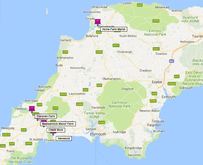Home Farm Marsh
|
Home Farm Marsh, at Lower Yelland, was an intensive dairy farm with arable production of fodder crops. Situated on the Taw/Torridge estuary, it borders the Tarka Trail, a popular long-distance path and cycleway. The Trust is keen to enhance biodiversity within Home Farm Marsh, working to restore the Marsh to its former status as a wetland. This is important because it adjoins the Taw & Torridge Estuary Site of Special Scientific Interest, and it lies close to the Braunton Burrows International Biosphere Reserve, England’s largest, and one of its best sand-dune systems. Home Farm Marsh lies between Salt Duck Pond and the RSPB’s Isley Marsh Reserve, both of which are SSSIs. The Gaia Trust acquired the 71 hectare site in 2002 with the support of a number of funding bodies (see below).
Formerly an intensive dairy unit, with consequent reduction in biodiversity, the land is now in conservation management through a farm tenancy and volunteer support. Enhancement of biodiversity is being achieved through low intensity farming. Species recovery is taking place at a faster pace than we had dared to hope and is being recorded by our volunteers. This is particularly noticeable with farmland birds that are in general decline elsewhere in the United Kingdom and includes Skylarks, Lapwings, Wheatears and Yellowhammers. In 2003, significant wetland restoration and habitat creation was carried out, establishing over 18.5 hectares of permanent pasture dominated by native grasses. New wetlands have been created, attracting many geese, ducks and wading birds, with signs that some are now breeding for the first time for many years. Arable fields are being managed to provide food and cover for a range of birds, mammals and invertebrates and to encourage the spread of typical wild flowers. These now support a wide variety of birds including the Skylarks, Linnets, Goldfinches and our resident Canada Geese. Arable weeds such as Sharp-leaved Fluellen, Common Field-speedwell and Dwarf Spurge are also returning to the crop fields in abundance. A group of local volunteers has been set up to carry out species recording, do practical conservation work and to assist visits from schools and special interest groups. Gates and signs have been installed along the visitors’ path to explain the farm and its management, and to persuade visitors to use the permissive path. The adjoining Tarka Trail is suitable for wheelchairs and the Trust is therefore developing a trail suitable for disabled access on this property. The Fremington Quay Environment Group has generously allowed The Gaia Trust to use the signal box at the quayside visitor centre and cafe for an interpretative display, designed for visitors to see before using the Tarka Trail to reach access points on the marsh (see Information & Fremington Visitor Centre). |
The acquisition of Home Farm Marsh was made possible with the help of the following:
Heritage Lottery Fund; Pennon Environmental Trust; Alan Evans Trust; Dulverton Trust; Four Winds Trust; Hamamelis Trust; H D H Wills Trust; Idlewild Trust; John Coates Trust; Linley Wightman Shaw Foundation; Norman Family Trust; N Smith Charity; Steel Trust; Mr Charles Bromley; Mr Derek Clough; Mr & Mrs Day; Ms K Gray. | ||||||||||||

